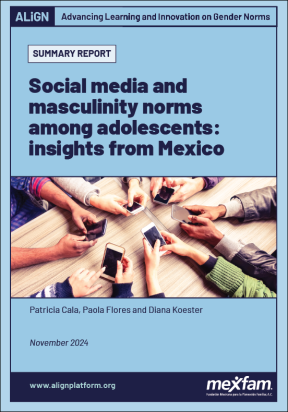
- Webinar/event recording
- 11 Mayo 2020
ALIGN is delighted to be supporting The International Center for Research on Women (ICRW) – a global non-profit research institute focused on tackling challenges facing women and girls worldwide – for this webinar on men and masculinities.
Given the growing efforts to engage with men in programming on gender equality, this webinar aims to generate a discussion with experts working on masculinities and gender equality in South Asia to understand how men and masculinities are reacting, struggling and transforming in this changing environment, and to generate recommendations to inform next-generation programming. Find out more about the background to this webinar and why we need to shift from asking why men should be engaged, to talking about how to best engage with them in ICRW's latest guest blog.
Webinar aims:
- Share learnings in feminist programming and advocacy about the realities of engaging men, with attention to key norms around masculinity that are resistant to change and result in backlash, confusion, and struggle
- Highlight what men stand to lose/or perceive that they will lose in the shift towards greater gender equality
- Share research and evidence on effective ways to engage with men to tackle these ‘sticky’ areas, and outline ways forward for next-generation programming
Chair/Moderator:
Ravi Verma has over three decades of experience working to tackle gender-based violence and has done a considerable amount of work to deconstruct violence from gender and masculinity perspectives. He has co-created some of the well-known innovative violence prevention programs like GEMS and sports-based program and also co-led International Men’s Gender Equality Survey (IMAGES) in many countries. He serves on many strategic national and international advisory boards and committees like National COVID 19 taskforce (NTF) on operational research and Lancet commission on Gender and Global Health.
Panellists:
Anand Tamang is the Chairperson and the Director of the Center for Research on Environment Health and Population Activities (CREHPA) – one of the leading research organisations in Nepal. He and his organization have pioneered public education and advocacy campaigns and policy dialogue at the national, district and community levels to decriminalise abortion in Nepal.
Babar Bashir is Managing Director at Rozan – a not-for-profit organisation based in Islamabad, and is working on issues related to child sexual abuse as well as their emotional and psychological health. The organisation aims “to work with all people, especially vulnerable groups, to collectively strive for a society that is violence free, self aware and accepting of itself and others.”
Imitiaz Saikh is the Chair and an Associate Professor at the Women and Gender Studies Department of Dhaka University. Imitiaz's PhD research was on young men, sexuality and construction of masculinities in Bangladesh and he also set up the Centre for Men and Masculinities Studies which is currently coordinating the Engaging Men and Boys Network in Bangladesh.
Satish Kumar Singh is Additional Director at the Centre for Health and Social Justice (CHSJ) in India. Satish oversees the thematic area of Men and Gender Equality in and has been working on social justice issues for more then 32 years. His primary focus is on gender equality, masculinity, and sexuality and gender based violence.
- Countries / Regions:
- South Asia
Related resources
Blog
14 Abril 2025

Report
19 Noviembre 2024

Report
13 Noviembre 2024
